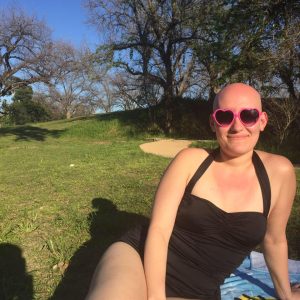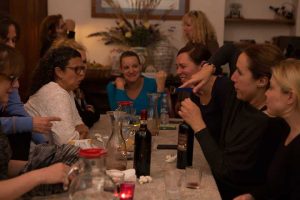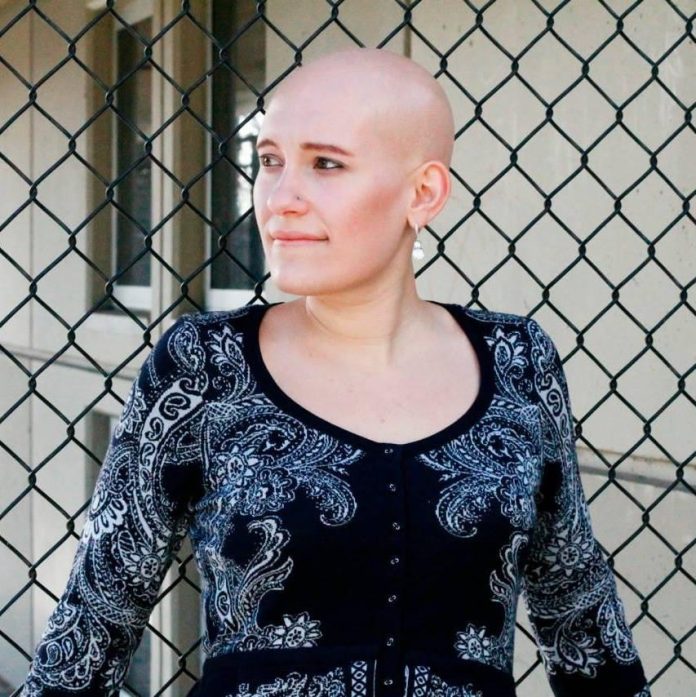Note from Jen Pastiloff, founder of The Manifest-Station. This is part of our Young Voices Series for Girl Power: You Are Enough. We are always looking for more writing from YOU! Make sure you follow us on instagram at @GirlPowerYouAreEnough and on Facebook here.
By Addie Newcombe
Many people have never heard of Alopecia Areata. It means you don’t have any hair. So the obvious million-dollar question comes up over and over again: if you could have your hair back, would you?
Many women answer yes, and that’s fine. But I offer a resounding NO! I do not want my hair back. Ever!
Yes, this puts me at odds with a lot of bald women, including the four profiled for a piece in the “Fashion and Style” section of the New York Times. They all wish they had their hair back because the emotional discomfort of being bald has not yet subsided—washing their insecurities clean.
Alopecia Areata is an autoimmune disease that attacks the hair follicles. It made me completely bald at the ripe old age of…six. That was fifteen years ago. Out of the 6.6 million people in the United States who have the disease, I have only met two people without hair—well, three including myself, but I’m still meeting parts of who I am. Not experiencing others with the disease has been extremely alienating. In a country with over 6.6 million people with my similarity, how have I only met TWO? Maybe I am wildly unaware of other people’s baldness or they are wearing hairpieces that are so life-like that I just don’t notice. I don’t think that is a bad thing, though. Anonymity is so hard to come by when you’re so physically different.
Regardless, I consider this disease an asset in my life, but it hasn’t always been easy. Sometimes I feel like I am the only one dealing with Alopecia. So it was cathartic to read about the women in the Time’s style piece, a relief not to feel so alone. As I read about their experiences I thought, “I know…it’s so annoying when people put is in the cancer box” and “Gosh, I also hate it when sweat pours into my eyes when I work out!” I can’t help but crack a smile and laugh. It isn’t so much because it is funny, but because I can finally breathe. Here are people in the same hairless predicament as me.
Moreover, I can understand why one might want one’s hair back: to appear normal, you know, the way others look. Aren’t women’s locks of love an essential part of who they are? Or maybe magazines and other media dictate our conceptions of “normal”—and what the hell does that look like anyway?
Sure, I struggle with these questions. But here’s the thing: I honestly, in my heart, love being bald! I wish these four women could truly see what I do when I read the article. I want to tell them about the ways in which Alopecia is a blessing. I wish they could see hair as an accessory rather than a staple, but this is out of my control. I need to understand that I cannot change people’s perceptions of the disease. I am not my hair and I will always answer that nagging question in the same way. I need to appreciate individual differences in acceptance.
The reason it’s okay that I’ve struggled with these questions is because through doing so, I’ve found a sort of confidence in being a badass bald woman. I’m freaking stunning in my own way and I hold that as true—after years of doubting it. My boyfriends—plural—have told me that I’m beautiful just the way I am. The man I’m currently seeing refers to my baldness as a “mild convenience” in that I don’t clog his shower drain and that when we cuddle he doesn’t choke on my hair. Other than that though, he said he never really thought twice about my baldness and I like that. The great thing about being bald is that when you find someone, you know it’s because they appreciate the beauty that comes from within—and that’s the best type of love. I think my baldness has never been a problem with the male variety because beauty is confidence. You have to love yourself (even the parts you hate) before you can expect someone else to.
So that’s what I am doing—loving my very bald self in an all-consuming way and not feeling bad about it.
When I had hair though, it was extremely bodacious and hard to handle—ironic, right? And at that age, it was up to my mom to manage it. So when I finally lost all my hair, my parents treated my baldness like it was normal, which is the only reason I was able to emotionally cope with the loss. My parents never put me in a wig because they were embarrassed. They waited until I asked if I could have one. I only wore the wig twice because it felt like a hair hat. So there went $5,000 out the window, but we all felt that was a small price to pay for me to feel authentic with my baldness.
Four women want their hair back. I do not. I must remember that no two bald people are the same. How could they be? But this doesn’t stop me from wanting to find someone who cherishes being bald as much as I do. All I can do is love myself. I own my disease.
Bald is me and the only way I ever want to be.

Addie Newcombe is a junior at Seattle University. At the age of six, she lost her hair to the autoimmune disease that attacks the hair follicles, Alopecia Areata. Living the past fifteen years as bald has been the best thing that could have ever happened to her. She had to learn that hair is an accessory, not a staple, and she had to learn that inner beauty shines through brighter than physical beauty. As a nonprofit minor at Seattle University, it has been very important to Addie to advocate for body-positivity and loving what makes you different. “Born To Be Bald” is her second piece accepted by the Manifest-Station.



Great article Addie!